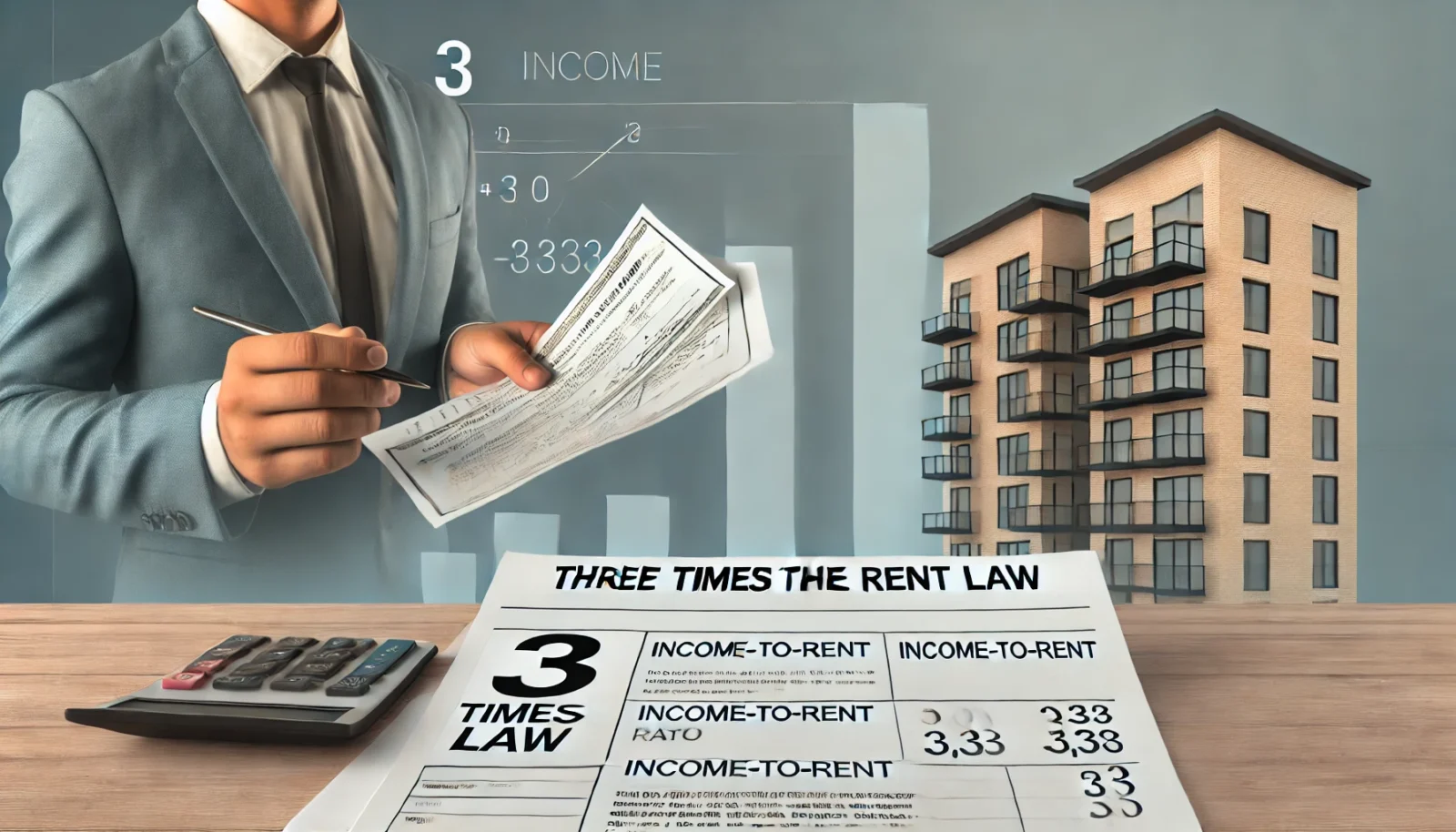Introduction to the Three Times the Rent Law
The Three Times the Rent Law is a rule used by many landlords and property managers. It means that a tenant’s income must be at least three times the rent of the property they want to rent. For example, if the rent is $1,000 per month, the tenant needs to earn at least $3,000 per month to qualify.
The purpose of the Three Times the Rent Law is to make sure that tenants can afford their rent without struggling financially. It helps landlords reduce the risk of tenants missing payments or getting evicted. This rule is very common in the housing and rental markets across the United States.
What Does the Three Times the Rent Law Mean?
The Three Times the Rent Law means that a tenant must have an income that is at least three times the rent of the property they are applying for. For example, if the rent is $1,200 per month, the tenant needs to earn at least $3,600 per month to qualify.
Landlords and property management companies use this rule to make sure tenants can afford the rent. They typically ask for proof of income, such as pay stubs or tax returns, to confirm the tenant’s ability to meet the three times the rent requirement. This helps them reduce the risk of late payments or defaults.
Why Was the Three Times the Rent Rule Created?
The Three Times the Rent Rule was created to make sure that tenants can comfortably afford their housing. The idea is that if a tenant earns three times the rent, they are more likely to have enough money left over for other living expenses like food, utilities, and transportation after paying rent.
This rule helps landlords and property management companies reduce the risk of rental defaults and evictions. When tenants can easily afford their rent, there is a lower chance they will miss payments or fall behind, which makes it safer for landlords to rent out their properties.
How is Income Calculated Under the Three Times the Rent Rule?
Gross vs. Net Income
When applying the Three Times the Rent Rule, most landlords and property managers use gross income, which is the total income before taxes and other deductions. This means that if a tenant needs to meet the three times the rent requirement, they will usually be asked to provide their gross income, not the net income (income after taxes).
Poppi Soda Lawsuit: Claims, Health Risks, And Consumer Reactions
What Types of Income Are Considered
Different types of income are considered when calculating if a tenant qualifies under the Three Times the Rent Rule. These typically include:
- Salary from a full-time or part-time job.
- Bonuses or commissions earned at work.
- Income from freelance or contract work.
Additional Sources of Income
Other sources of income can also help tenants meet the three times the rent requirement. These might include:
- Income from part-time jobs.
- Alimony or child support payments.
- Social security or disability benefits.
- Rental income from other properties.
All of these can be factored in to show that the tenant earns enough to meet the required income level.
Is the Three Times the Rent Rule a Law or Just a Guideline?
The Three Times the Rent Rule is not an official law but rather a widely accepted standard used by landlords and property management companies. It is a guideline that helps them decide if a tenant can afford to rent a property. There is no federal or state law that requires landlords to follow this rule, but many do as a common practice.
Differences Across States or Cities
While the Three Times the Rent Rule is commonly used across the United States, its application can vary between states and cities. Some cities with high housing costs may have different methods to determine if a tenant can afford rent, and in areas with more affordable housing, landlords may be more flexible with income requirements. Additionally, certain housing programs or rent assistance might have their own rules that override the three times the rent guideline.
Exceptions to the Three Times the Rent Rule
Circumstances Where the Rule Might Not Apply
There are several situations where the Three Times the Rent Rule might not apply. Some landlords may be more flexible, especially if a tenant has an excellent rental history or a high credit score. In some cases, tenants may negotiate or provide additional security deposits to bypass the rule.
Low-Income Housing, Section 8 Vouchers, or Other Assistance Programs
The Three Times the Rent Rule often does not apply to low-income housing or tenants receiving assistance through programs like Section 8. These programs are designed to help tenants afford housing, and rent is typically adjusted based on the tenant’s income. The tenant may pay a portion of the rent, while the rest is covered by the assistance program, making the three times the rent requirement irrelevant in these cases. Other government or nonprofit housing programs may also have different income requirements that replace or adjust this rule.
Challenges Faced by Tenants Due to the Three Times the Rent Rule
Difficulties for Low-Income Renters or Those with Inconsistent Income
The Three Times the Rent Rule poses significant challenges for low-income renters or individuals with inconsistent income. Many people with low-paying jobs, seasonal work, or unstable employment may struggle to meet the income requirement, even if they are otherwise reliable tenants. This can make it difficult for them to secure housing, even if they have a good rental history or strong references.
The Impact on Young Professionals, Students, or Self-Employed Individuals
Young professionals, students, or self-employed individuals often face difficulties with the Three Times the Rent Rule. For students or those just starting their careers, their income may not yet meet the required level, even if they can afford the rent with loans or savings. Self-employed individuals may also face problems, as their income can fluctuate, making it hard to prove they consistently earn three times the rent.
How the Rule Might Limit Rental Options in Expensive Housing Markets
In expensive housing markets, the Three Times the Rent Rule can significantly limit a tenant’s rental options. As rents rise, the income requirement also increases, making it harder for tenants to find affordable housing. This is especially problematic in cities where rental prices are high, but wages have not increased at the same rate. Many renters are priced out of neighborhoods or forced to look for shared housing to meet the income criteria.
Alternatives to the Three Times the Rent Rule
Other Ways Landlords Assess a Tenant’s Ability to Pay
In addition to the Three Times the Rent Rule, landlords often use other methods to determine if a tenant can afford rent. These include:
- Credit Score: A good credit score can show that a tenant is responsible with their finances and can be trusted to pay rent on time.
- Rental History: Landlords may review a tenant’s past rental history to see if they’ve made timely payments and maintained a positive relationship with previous landlords.
- Employment Verification: Confirming steady employment and length of time at a job can also reassure landlords that the tenant has a stable source of income.
Co-signers and Guarantors as Solutions for Tenants Who Don’t Meet the Rule
For tenants who cannot meet the Three Times the Rent Rule, having a co-signer or guarantor can be an effective solution. A co-signer is someone, often a family member, who agrees to be legally responsible for the rent if the tenant cannot pay. This provides extra security for landlords. Guarantors can also be used, especially for students or young professionals, to guarantee the rent will be covered even if the tenant’s income falls short of the requirement.
Legal Protections and Tenant Rights Regarding Rental Income Requirements
What Tenants Can Do if They Face Discrimination or Unfair Rental Practices
If tenants believe they are facing discrimination or unfair rental practices based on their income or inability to meet the Three Times the Rent Rule, they have legal protections under the Fair Housing Act. This law prohibits discrimination based on race, color, national origin, religion, sex, familial status, or disability. Tenants who feel discriminated against can file a complaint with the U.S. Department of Housing and Urban Development (HUD) or their state’s fair housing agency. In cases where the income requirement seems excessive or discriminatory, tenants can seek legal help to challenge the practice.
Legal Advice or Avenues for Challenging Rigid Income Requirements
If a tenant cannot meet the Three Times the Rent Rule and believes the landlord is being unreasonably rigid, there are legal avenues to explore. Local tenant advocacy groups or legal aid organizations often provide free or low-cost legal advice to help tenants understand their rights. Some cities or states have rent control or tenant protection laws that may limit the power of landlords to impose overly strict income requirements. Tenants can also negotiate directly with landlords, offering solutions like co-signers or providing additional documentation that demonstrates their ability to pay rent consistently.
How the Three Times the Rent Rule Affects the Rental Market
Impact on Housing Affordability
The Three Times the Rent Rule can significantly affect housing affordability, particularly in areas with high rental costs. Many tenants, especially those with low or moderate incomes, find it difficult to meet the income requirement. This can make it harder for them to secure housing, forcing them to look for cheaper options, move farther from city centers, or consider shared living arrangements. As rents increase, more tenants are priced out of neighborhoods, making housing less accessible for a broader portion of the population.
How It Influences Tenant Turnover and Vacancy Rates
The Three Times the Rent Rule can also influence tenant turnover and vacancy rates. While the rule helps landlords ensure they are renting to tenants who can afford the rent, it can also result in higher vacancy rates if fewer tenants qualify. This could lead to properties staying empty for longer periods. Additionally, strict income requirements might cause higher tenant turnover as renters are unable to keep up with rising rents or find more affordable options elsewhere. On the other hand, the rule can help landlords maintain more stable tenancies, as tenants who meet the requirement are less likely to default on their rent, reducing the chances of eviction.
Criticism of the Three Times the Rent Rule
Arguments Against the Rule, Including Its Impact on Affordability and Housing Access
Critics argue that the Three Times the Rent Rule limits housing affordability and restricts housing access for a large number of renters, particularly in high-rent areas. By requiring tenants to earn three times the rent, many renters are automatically disqualified from a wide range of housing options, even if they are capable of making rent through budgeting or other sources of financial support. This makes it difficult for individuals, especially those in expensive urban areas, to secure housing.
The Disparity It Creates for Low-Income and Minority Renters
The Three Times the Rent Rule disproportionately affects low-income renters and minority groups, who often face financial challenges due to systemic issues like wage gaps and limited access to high-paying jobs. These groups are more likely to be rejected by landlords based on income requirements, even if they have good rental histories or other financial support. This creates a barrier for marginalized communities, making it harder for them to secure stable housing and perpetuating housing inequality.
The Role of the Rule in Widening the Housing Gap
The Three Times the Rent Rule plays a significant role in widening the housing gap. By making it more difficult for lower-income individuals to rent, the rule contributes to economic segregation, where wealthier individuals have more access to desirable housing, while others are pushed into less favorable or more distant areas. This creates a cycle where low-income renters are forced into higher turnover rates and face greater difficulties in building long-term financial stability, thus widening the gap between those who can afford stable housing and those who cannot.
Strategies for Tenants Who Don’t Meet the Three Times the Rent Rule
Tips for Negotiating with Landlords or Property Managers
If you don’t meet the Three Times the Rent Rule, it’s possible to negotiate with landlords or property managers. Here are some strategies:
- Provide a larger security deposit: Offering extra upfront may give landlords more confidence in your ability to pay.
- Offer a co-signer: A co-signer with a stronger financial background can reassure the landlord that rent will be covered.
- Show proof of reliable payments: If you’ve consistently paid rent on time in the past, provide records of this as evidence of your reliability.
- Negotiate lease terms: Offer to sign a longer lease or suggest flexible rent payment options to demonstrate your commitment.
Financial Planning and Budgeting Advice to Meet Rent Requirements
If you are close to meeting the income requirement, good financial planning can help:
- Create a budget: Track your expenses to ensure you have enough left over each month for rent.
- Cut non-essential spending: Reduce unnecessary costs like dining out, entertainment, or subscription services to save money for rent.
- Boost your income: Consider taking on a part-time job, freelance work, or a side hustle to increase your earnings.
- Set up an emergency fund: Having savings to cover unexpected costs can give landlords more confidence in your financial stability.
Alternative Housing Solutions Like Shared Rentals or Co-Living Arrangements
If meeting the income requirement is not feasible, consider alternative housing options:
- Shared rentals: Renting a property with roommates can reduce individual rent costs, making it easier to meet the income rule.
- Co-living arrangements: These housing setups are designed for individuals to share communal spaces while paying lower rent.
- Subleasing: Some tenants may allow you to sublease part of their apartment, offering a more flexible and affordable solution.
Future of the Three Times the Rent Rule
Ongoing Debates and Potential Reforms in Rental Income Requirements
There are ongoing debates around the fairness of the Three Times the Rent Rule. Critics argue that the rule disproportionately affects low-income renters and widens the housing gap. As housing affordability becomes a growing concern, especially in urban areas, advocates are pushing for reforms to make rental income requirements more flexible. Some propose that landlords consider alternative factors like rental history, credit scores, and savings rather than strictly enforcing the three times income rule.
Predictions for Changes in Rental Screening Practices
In the future, rental screening practices may become more adaptive to reflect the realities of different financial situations. Landlords may move away from rigid income requirements and adopt more holistic approaches, taking into account factors such as consistent rent payments, the presence of a reliable co-signer, and alternative income sources like freelance work. Additionally, technology could play a role in streamlining screening practices, allowing for a more personalized evaluation of tenants’ financial stability rather than relying solely on income-based formulas like the Three Times the Rent Rule.
Conclusion
The Three Times the Rent Rule plays a significant role in rental markets, but it has its share of challenges and criticisms. While it helps landlords ensure tenants can afford housing, it often limits access for low-income renters, young professionals, and others with non-traditional income streams. As debates around housing affordability continue, we may see reforms to this rule, with more flexible and inclusive rental screening practices. For now, understanding the Three Times the Rent Rule and knowing strategies to navigate it can help renters secure housing, even in a competitive market.
FAQs About the Three Times the Rent Rule
What is the Three Times the Rent Rule?
The Three Times the Rent Rule is a common guideline used by landlords that requires a tenant to earn three times the monthly rent in income to qualify for a rental property.
Is the Three Times the Rent Rule a law?
No, the Three Times the Rent Rule is not a legal requirement but rather a widely accepted standard used by many landlords and property management companies.
What income is considered for the Three Times the Rent Rule?
Landlords typically consider gross income (before taxes), which can include salary, bonuses, freelance income, and additional sources like child support or alimony.
What happens if I don’t meet the Three Times the Rent Rule?
If you don’t meet the income requirement, you can try negotiating with the landlord, offering a co-signer, or exploring shared rental or co-living arrangements.
Are there any exceptions to the Three Times the Rent Rule?
Yes, exceptions often apply in low-income housing, Section 8 programs, or when landlords are willing to consider other factors like credit score or rental history.
Can I still rent if my income doesn’t meet the rule?
Yes, many landlords allow alternatives like providing a co-signer, increasing your security deposit, or demonstrating strong rental history to secure the rental.
Why was the Three Times the Rent Rule created?
The rule was created to ensure that tenants can comfortably afford rent and to reduce the risk of rental defaults or evictions for landlords.
Is the Three Times the Rent Rule used in every state?
While widely used across the U.S., it is not mandatory in every state. Some areas have more flexible requirements, especially in affordable housing programs.
How can I calculate if I meet the Three Times the Rent Rule?
Multiply the monthly rent by three. For example, if rent is $1,000, your monthly income should be at least $3,000 to meet the requirement.
Are there any ongoing reforms to change the Three Times the Rent Rule?
Yes, there are ongoing discussions to make rental screening practices more flexible and inclusive, particularly for low-income renters and people with non-traditional income sources.
Read For More Amazing Blogs Law Firm Genius.
















Got a Questions?
Find us on Socials or Contact us and we’ll get back to you as soon as possible.